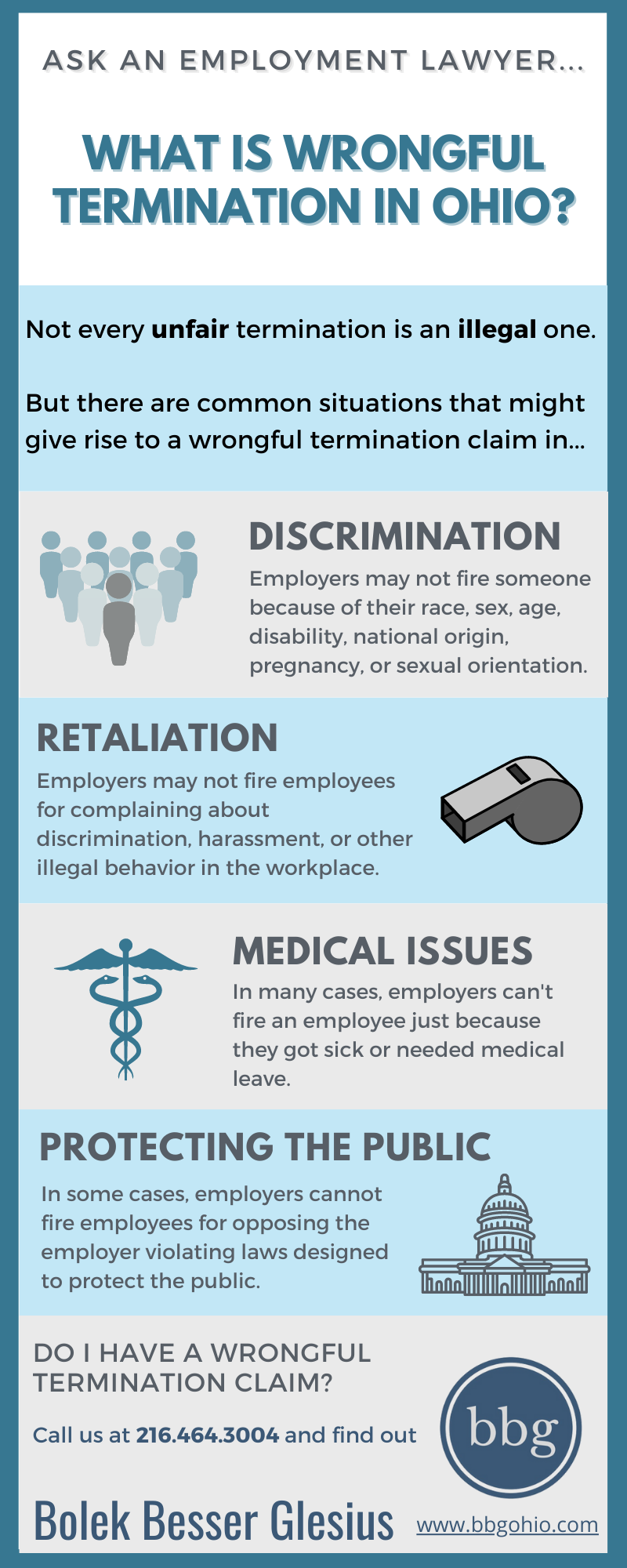Wrongful Termination Attorney for Employees in Ohio
“Wrongful termination” is a phrase that’s widely known but easily misunderstood. Common sense suggests an employer breaks the law whenever it fires an employee unfairly or without just cause. That isn’t necessarily so. Though Ohio and federal employment laws prohibit firing employees under many circumstances, they don’t apply every time an employer fires someone unfairly. The best way to know whether you’ve been fired illegally is to speak with a wrongful termination attorney.
Understanding At-Will Employment in Ohio
First of all, it’s important to understand that Ohio is what’s called an “at-will” employment state. At-will employment means that unless an employee has an employment contract, an employer can fire the employee at any time and for any reason, as long as that reason is not prohibited by some other law. To put it another way, firing someone “unfairly,” isn’t the same as firing them “illegally.” But there are plenty of protections for Ohio employees. And the phrase “wrongful termination” might be used to describe any one of them.
When to Call a Wrongful Termination Lawyer
First, employers may not fire employees for a discriminatory reason. Various Ohio and federal employment laws protect employees from termination based on age, disability, gender, race, religion, color, national origin, pregnancy, military status, or genetic information. Because Ohio employment discrimination law applies to smaller employers than federal law in some instances, Ohio law might protect an employee where federal law does not. If you’re unsure whether your firing was legal, a wrongful termination lawyer can help assess your rights and options.
 Second, employers may not fire employees in retaliation for blowing the whistle on discrimination or other illegal conduct. Quite a few Ohio and federal laws protect employees who engage in what is called “protected activity.” Some examples of protected activity include:
Second, employers may not fire employees in retaliation for blowing the whistle on discrimination or other illegal conduct. Quite a few Ohio and federal laws protect employees who engage in what is called “protected activity.” Some examples of protected activity include:
- making a good faith complaint of employment discrimination;
- participating in an investigation into employment discrimination;
- providing testimony in an employment discrimination case;
- opposing discriminatory behavior in the workplace in general;
- requesting a reasonable accommodation for a disability or religious practice; or,
- requesting leave under the Family and Medical Leave Act.
Two other fairly common examples include protection for employees who report corporate or shareholder fraud, as well as those who report workplace safety violations. Employees who report other types of fraud by their employers might also be protected, depending on the type of fraud and to whom the employee makes the report. These cases can be complicated to win though, and they require help from an experienced wrongful termination attorney.
What is “wrongful termination?”

There is also a claim under Ohio common law called “wrongful discharge in violation of public policy.” The Ohio Supreme Court first recognized this type of claim in a 1990 case called Greeley v. Miami Valley Maintenance Contractors, Inc. It applies in certain situations where an employee is fired for reasons that would jeopardize an important public policy. To prevail on this claim, an employee must prove four things:
- That there is a relevant and clear public policy found in the Ohio or United States Constitutions, a statute, administrative regulation, or in the common law. This is commonly known as the “clarity” element.
- Firing employees under the circumstances involved in the employee’s termination would jeopardize the public policy at issue. This is called the “jeopardy” element.
- The employer’s decision to fire the employee was motivated by conduct related to the public policy at issue—also known as the “causation” element.
- Finally, the employer did not have an overriding legitimate business to fire the employee, which is unsurprisingly known as the “overriding justification” element.
These claims might seem at first glance to be fairly straightforward. They are anything but. Court decisions over the years have significantly limited an employee’s ability to bring them. As a result, these claims will be successful only under a very limited set of circumstances. In most situations, illegally fired employees must look to another employment or retaliation law for protection. No matter what type of claim you have, you need a wrongful termination attorney who will fight for you.
Seek Help From Our Skilled Wrongful Termination Lawyers
If you’ve been fired unlawfully, talking to an experienced wrongful termination attorney should be your very first step. The wrongful termination lawyers at Bolek Besser Glesius have helped many employees vindicate their rights after they were fired illegally. We are devoted to justice, and we’ll be devoted to getting it for you. Contact us or request a free consultation today.

